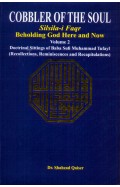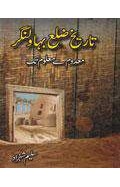Iqbal and Khawaja Ghulam Farid on experiencing God
By: Shahzad Qaiser
-
Rs 396.00
- Rs 440.00
- 10%
You save Rs 44.00.
Due to constant currency fluctuation, prices are subject to change with or without notice.
Sense-perception and heart perception are levels of knowledge (epistemology) based on experience with their corresponding levels of being (ontology). The Prophetic experience is the highest form of experience. It integrates the forms of knowledge and being in a unique way. The possibility of experiencing God remains an open possibility, realisable by the mystics and the Sufis, but with Iqbal‟s proviso “that all personal authority claiming a supernatural origin has come to an end in the history of man.” 1 This proviso closes the door to all the intrinsic heresies in any form since they are not only contrary to the metaphysical and religious truths, but threaten the very solidarity of the Muslim Ummah as well. Allama Iqbal‟s religious metaphysics and Khawaja Ghulam Farid‟s traditional metaphysics consider God as experiential Reality with the possibilities of mystic and metaphysical realization. They are in agreement that the Prophetic Revelation has closed the Cycle of Nubuwwah (Prophecy) for all times to come and has opened the Cycle of Walayah (Sanctity). The finality of the Prophethood is the foundation of Islam‟s Theory and Practice. It is also linked with the universality and livingness of the Prophet of Islam both at the cosmic and the terrestrial levels. We have to realise that the blessings of Allah and His angels on the
Prophet as enshrined in the Qur‟an, among other things, is the metaphysical proof of Muhammad‟s finality, universality and livingness. It is a metaphysical doctrine,
which leads to spiritual realisation of the Prophetic presence (huduri) too.
Modern psychology is based on the confusion between the realm of the psyche (nafs) and the plane of the Spirit (Ruh). It tends to interpret the spiritual realities on the
psychic plane leading to the distortion of metaphysical and religious truths. Sigmund Freud, James. H. Leuba and others have no criterion to distinguish between the mystic
and the neurotic states or between the mystic and the drug induced states. Their findings do not reach the heart of the matter. One of the greatest contributions of Allama Iqbal as a philosopher and a philosophical psychologist is that he has made a critique of modern psychology and has presented the case of the genuineness of religious experience on firm foundations.
Allama Iqbal‟s concept of the periods or stages of religious life make us realise that religious life is not static but is dynamic in nature. Religiosity, in the ultimate
analysis, is transformed into spirituality. It is by virtue of mushahida (witnessing) that religion assumes a higher form and the votary integrates his inward with the outward,
which Iqbal terms as the period of “Discovery.” Allama Iqbal and Khawaja Ghulam Farid have added fresh metaphysical insights in understanding man-God
polarity. Khawaja Ghulam Farid as a Sufi in the tradition of Bayazid Bistami, Mansur Hallaj, Ibn Arabi and his spiritual master, Fakhr-e-Jahan further offers a metaphysical
possibility of transcending this polarity by realising the metaphysical identity of knowledge and being.
Sense-perception and heart perception are levels of knowledge (epistemology) based on experience with their corresponding levels of being (ontology). The Prophetic experience is the highest form of experience. It integrates the forms of knowledge and being in a unique way. The possibility of experiencing God remains an open possibility, realisable by the mystics and the Sufis, but with Iqbal‟s proviso “that all personal authority claiming a supernatural origin has come to an end in the history of man.” 1 This proviso closes the door to all the intrinsic heresies in any form since they are not only contrary to the metaphysical and religious truths, but threaten the very solidarity of the Muslim Ummah as well. Allama Iqbal‟s religious metaphysics and Khawaja Ghulam Farid‟s traditional metaphysics consider God as experiential Reality with the possibilities of mystic and metaphysical realization. They are in agreement that the Prophetic Revelation has closed the Cycle of Nubuwwah (Prophecy) for all times to come and has opened the Cycle of Walayah (Sanctity). The finality of the Prophethood is the foundation of Islam‟s Theory and Practice. It is also linked with the universality and livingness of the Prophet of Islam both at the cosmic and the terrestrial levels. We have to realise that the blessings of Allah and His angels on the
Prophet as enshrined in the Qur‟an, among other things, is the metaphysical proof of Muhammad‟s finality, universality and livingness. It is a metaphysical doctrine,
which leads to spiritual realisation of the Prophetic presence (huduri) too.
Modern psychology is based on the confusion between the realm of the psyche (nafs) and the plane of the Spirit (Ruh). It tends to interpret the spiritual realities on the
psychic plane leading to the distortion of metaphysical and religious truths. Sigmund Freud, James. H. Leuba and others have no criterion to distinguish between the mystic
and the neurotic states or between the mystic and the drug induced states. Their findings do not reach the heart of the matter. One of the greatest contributions of Allama Iqbal as a philosopher and a philosophical psychologist is that he has made a critique of modern psychology and has presented the case of the genuineness of religious experience on firm foundations.
Allama Iqbal‟s concept of the periods or stages of religious life make us realise that religious life is not static but is dynamic in nature. Religiosity, in the ultimate
analysis, is transformed into spirituality. It is by virtue of mushahida (witnessing) that religion assumes a higher form and the votary integrates his inward with the outward,
which Iqbal terms as the period of “Discovery.” Allama Iqbal and Khawaja Ghulam Farid have added fresh metaphysical insights in understanding man-God
polarity. Khawaja Ghulam Farid as a Sufi in the tradition of Bayazid Bistami, Mansur Hallaj, Ibn Arabi and his spiritual master, Fakhr-e-Jahan further offers a metaphysical
possibility of transcending this polarity by realising the metaphysical identity of knowledge and being.
Iqbal and Khawaja Ghulam Farid on experiencing God
By: Shahzad Qaiser
Rs 396.00 Rs 440.00 Ex Tax :Rs 396.00
Zubin Mehta: A Musical Journey (An Authorized Biography)
By: VOID - Bakhtiar K. Dadabhoy
Rs 892.50 Rs 1,050.00 Ex Tax :Rs 892.50
No similar books from this author available at the moment.
No recently viewed books available at the moment.
Zubin Mehta: A Musical Journey (An Authorized Biography)
By: VOID - Bakhtiar K. Dadabhoy
Rs 892.50 Rs 1,050.00 Ex Tax :Rs 892.50
Iqbal and Khawaja Ghulam Farid on experiencing God
By: Shahzad Qaiser
Rs 396.00 Rs 440.00 Ex Tax :Rs 396.00















-120x187.jpg?q6)







-120x187.jpg?q6)

-120x187.jpg?q6)

-120x187.jpg?q6)

